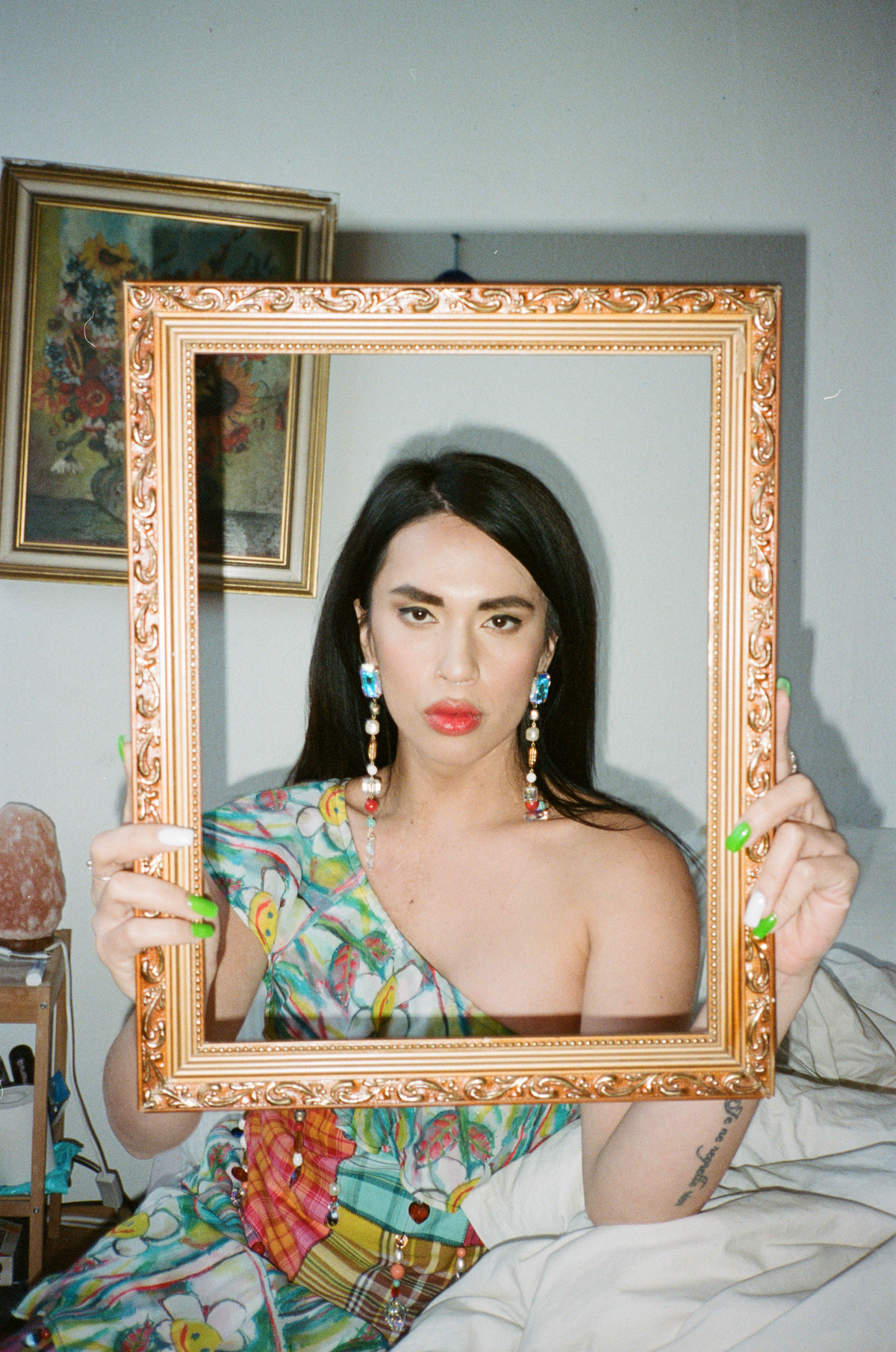*Our interviews with Marcella, Maxien, and Ruby took place in the summer of 2017 so…
Alyha
Re-defining beauty13 February 2019
We met up with Alyha, a DJ and activist whose arrival onto the Berlin club scene is bringing about much needed trans awareness.
My name is Alyha Love, and I am originally from Long Beach, California. I started school in San Francisco but then I dropped out to throw parties, and that’s when I moved to Berlin, two years ago. My dad is Vietnamese and my mom is Native American and white, so there are a lot of intersectionalities that run through my blood. I came to Berlin to become a DJ and learn music.
On Intersectionality
As a trans woman of colour (WOC), you stand at an intersection between race and gender identity. Can you touch upon your experiences at this crossroad?
Alyha: If I was just a woman of colour, I think my life would be completely different. I would probably be married, or have kids by now because I do feel like I have this maternal person inside of me. I do want to become a mother but … well, I still can be a mother, but at the same time, I don’t think I am ready because I am still figuring out what I need to do with my time on this earth.
Obviously, if I was a white trans woman, I would benefit from white privilege and my life would be completely different. I think that I am happy to have had my experiences as a trans woman of colour because I definitely have character. I am happy to be able to be there for whoever needs me; whether it’s my friends or people who are going through [life] thinking about their gender identity.
Do you feel that drug use is higher for trans women of colour because their experiences are more difficult to deal with?
Alyha: Yeah, I do. I think it’s true that trans women of colour are more prone to substance abuse because we are kind of on the bottom totem pole of society. We are not able to get jobs as easily as white trans women (or cis women) and we are often forced into prostitution because that is (kind of) the only job that is available to us. At the end of the day, we all want to feel wanted and loved. We have to deal with getting paid for our bodies and also getting shunned for being trans in public.
Although the conversation about being trans is more open nowadays, I still have to deal with people being ashamed to be seen with me — or who want to fuck me in the middle of the night but don’t want to take me out in the middle of the day — because they are scared of what people will think of them. It’s kind of sad to be part of this statistic.
What do you do then, when you meet someone, and you really hit it off, but they have an issue with being seen with you in public?
Alyha: If I get any hint that this is what they are about I will drop them. I will try to educate at first and be like, “this is why I am not talking to you anymore” and “I hope the next person that you are involved with (whether they are trans or not) you do not treat them this way.” I do want to say that I have been blessed to have people who have loved me for who I am.
My first boyfriend was so sweet and we were together for seven years. He was proud to be with me and that just recently ended. I am kind of going through not having somebody there emotionally in that role of being my boyfriend and it’s hard. There are good men out there, who are so secure with themselves and their sexualities and are proud to be with trans women. They are not ‘tranny chasers’ and I think we need to applaud them and say, “Thank you for being the person to love me and teach me how to love.” My first boyfriend actually taught me this, but I did not know how to be in a relationship with him. He kind of got the shitty parts of me, which I [am] really sad to think about now, but this is how you grow, right?
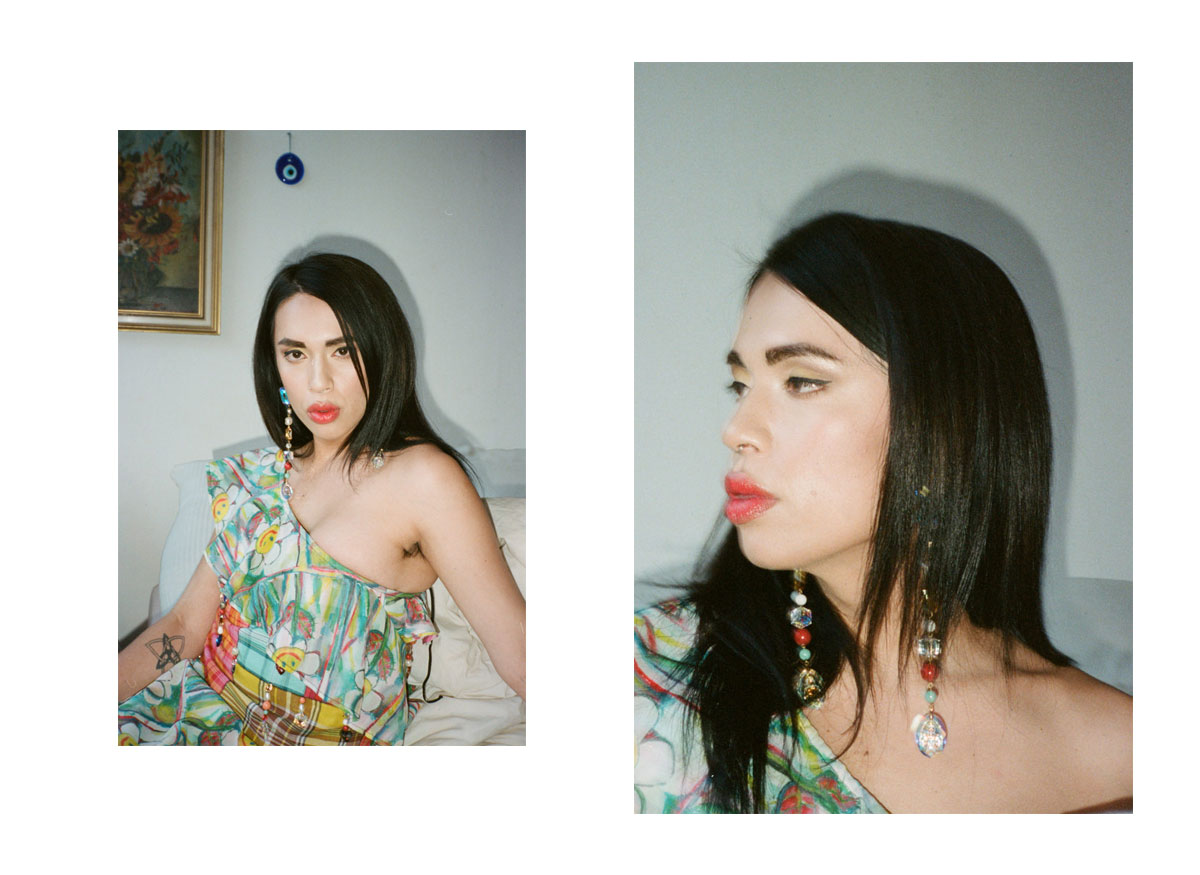
Stylist: Camille Naomi Fanke
Makeup and Hair: Prinz Basil
Alyha wears full Look by Julia Seemann
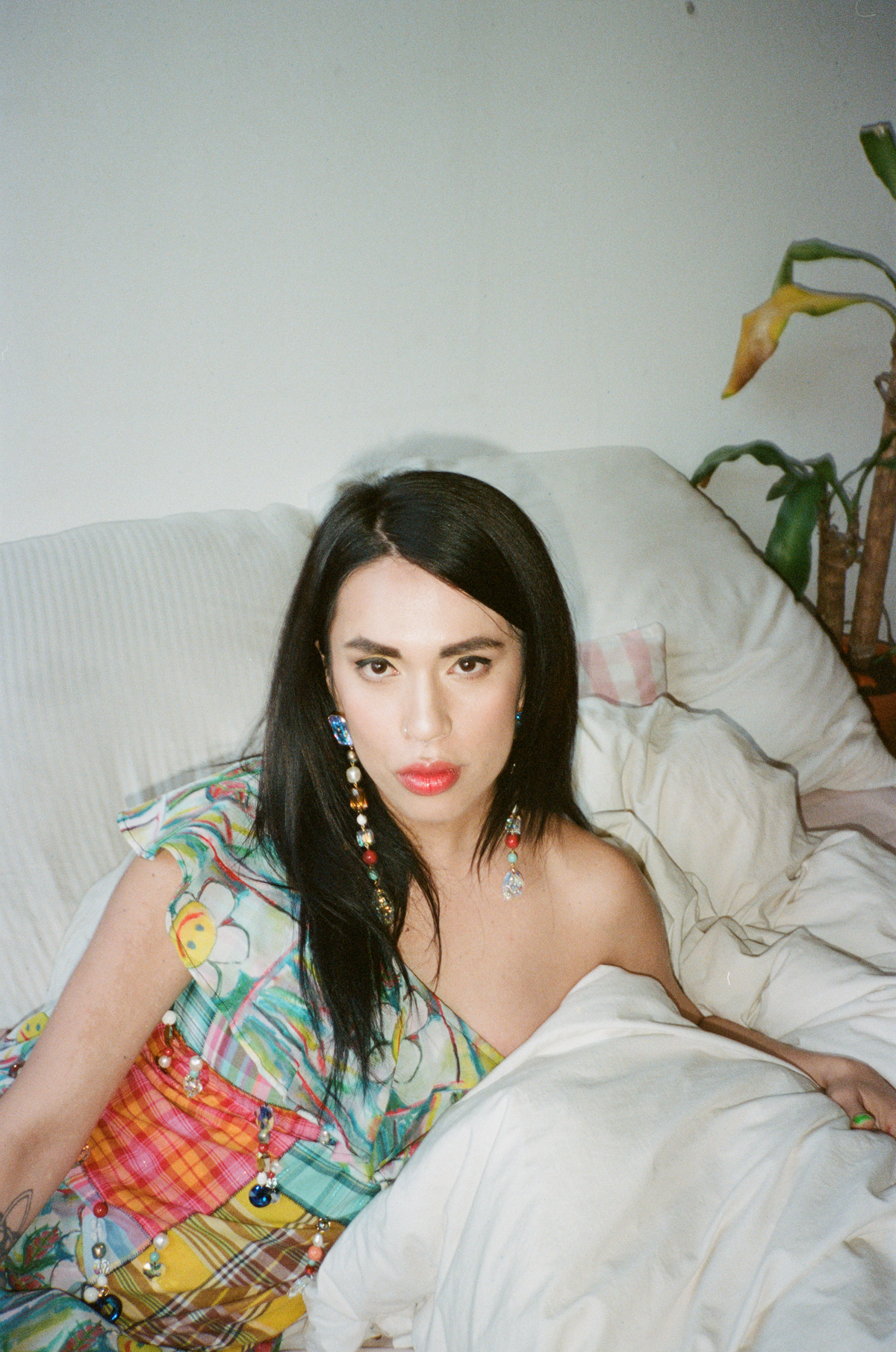
Stylist: Camille Naomi Fanke
Makeup and Hair: Prinz Basil
Alyha wears full Look by Julia Seemann
It is so important to hear about your experiences because for non-trans women standing at intersections, it’s so hard to know about the experiences of a trans woman unless you sit down and talk to her to learn.
Alyha: Yes, and I think this is so important. Everyone needs a gay friend or a trans friend to kind of be familiarised with the struggles that we go through. And yes, on one hand, I know that I shouldn’t have to be in this teacher role but at the same time, I know I will be for the rest of my life because that is just how it is. People don’t have that connection to people like me, or people who have been ostracized by those in society; which is why I am open to people who are curious and want to understand — depending on how they approach it.
Can you share with us your feelings on white feminism? Or feminism which only focuses on the struggles of cisgender white women?
Alyha: I think that white women need to be more of an ally to women of colour and oppressed women. They are the closest thing to white men that could possibly change their minds, so they need to stand up for the rest of us who are oppressed. Feminism needs to encompass all women, not just cis white women in this world. There are women of colour, trans women, disabled women… so I think that is what they need to do; stand beside us, listen to us, and maybe take a step back when we are telling our stories [especially] when we are expressing that we need help.
I assume there are certain universal struggles that all trans-WOC face regardless of where they are living. Baring in mind there are still many differences between Germany and the United States, how has your experience as a trans woman of colour differed since moving to Berlin? How has it stayed the same?
Alyha: I think as a trans woman, everywhere we go we are going to stick out like a sore thumb. Unless you have gotten your surgeries, or you have passing privilege, things are quite the same. I still get attacked on the streets; I actually got physically attacked in London. I was with another trans woman and we were in Bethnal Green. They came up behind us and elbowed my friend in her chest, and one punched me behind the back [of my] head. They were on their bikes so I couldn’t go after them. They [were] not even adults so for them to do this to us just really angered me. I couldn’t catch up to them to teach them a lesson. It was in public [and] no one did anything. Like I said, everywhere we go we kind of have to be aware of our surroundings.
Things are a bit different here in Berlin. A lot of people are about their goals, so it’s kind of hard for me to find my community because I had that in San Fran. I was kind of living in a trans bubble where all my friends were trans and I just had a love of love and support around me. I came [to Berlin] alone, so I did not really know anyone and had to meet people through partying. Luckily, after two years, I found a group of friends who really love me, and I am so happy and grateful for them.
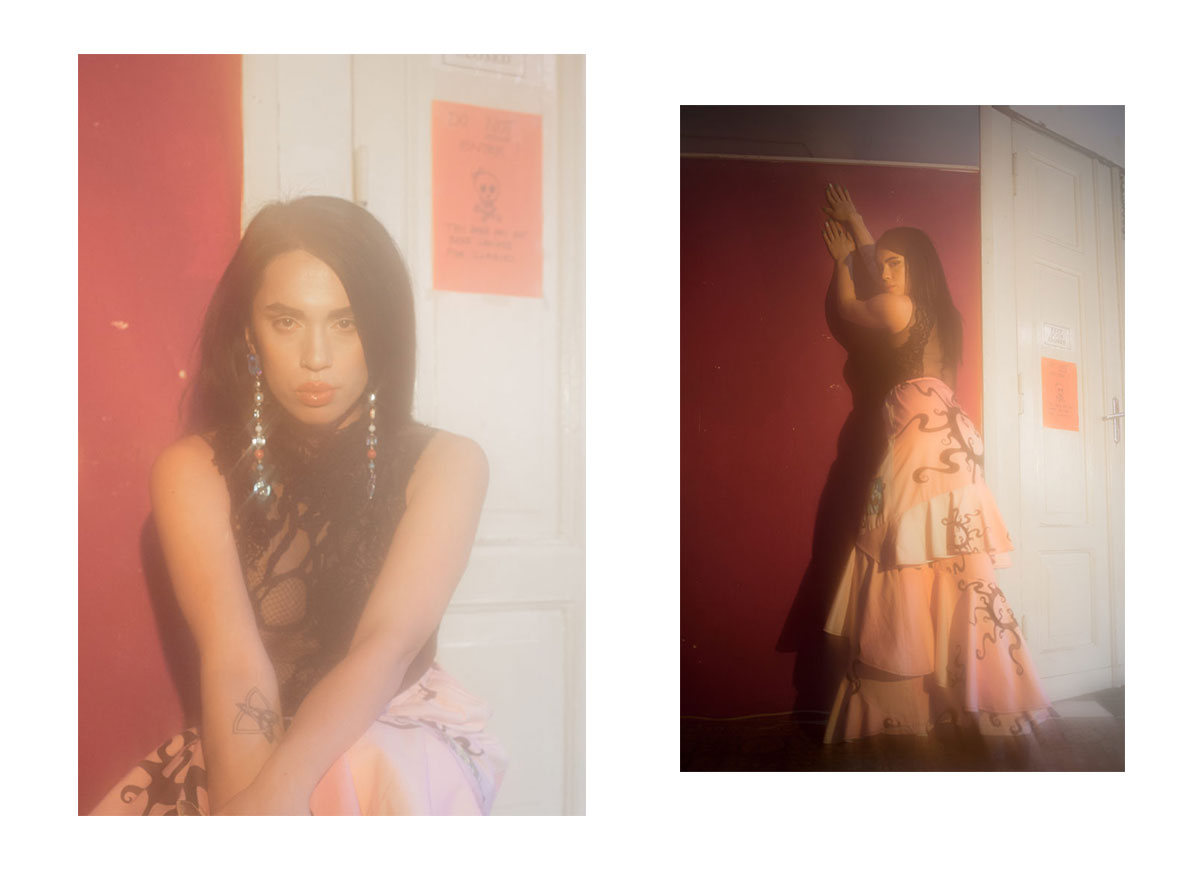
Stylist: Camille Naomi Fanke
Makeup and Hair: Prinz Basil
Alyha wears earrings and skirt by Julia Seemann, top stylist’s own
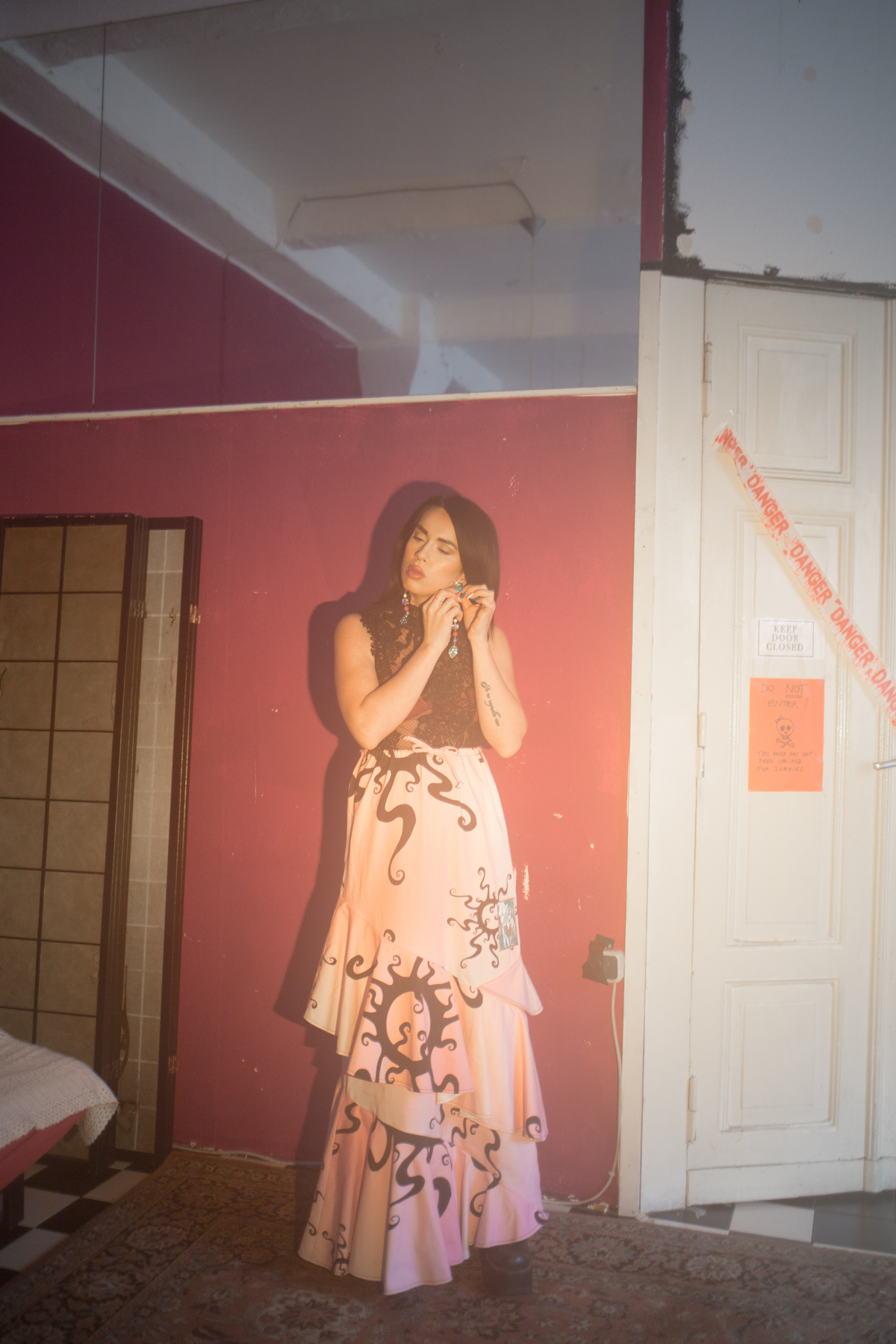
Stylist: Camille Naomi Fanke
Makeup and Hair: Prinz Basil
Alyha wears earrings and skirt by Julia Seemann, top stylist’s own
Do you find that people facing intersectional identities not as readily accepted by the mainstream find their strength and community through the party scene?
Alyha: Oh, definitely. I think that’s where a lot of people go to escape reality and create their own fantasy; that is the allure of Berlin. That you are able to come here and be yourself at night and live the life that you want. There are so many different lifestyles here that you cannot get anywhere else. Even for me – I was working so much back in San Fran (don’t get me wrong, I still work) but I work a lot less and I still have time to pursue my artistic goals. I am so happy to have this freedom. Intersectionality is connected in every part of our lives [and] that is what people need to realise.
Do you consider yourself as a transwoman that is ‘passing’ and do you see a level of privilege for those who are ‘passing’?
Alyha: Yeah I think so, and I think that I will acknowledge this passing privilege that people say I do have, but it’s different for everyone. For me, I deal with body dysphoria and gender dysphoria and I need to get surgeries to feel happy with myself. So many people say, “You’re so passing, I didn’t even know you were trans until you said something.” It’s weird because it’s different for different people. Some people think I am passing and other people tell me, “oh yeah I could tell.” It’s strange and I think it’s very important for trans women to feel comfortable in their skin and their body; to see themselves how they want to see themselves and for them to pursue surgeries they think they need.
Is there a fear among trans women who have undergone surgeries to appear cisgender that violence is still imminent when meeting new people? For example, if said person has not undergone bottom surgery, then becomes intimate with someone who believes they are cis, are the chances of being attacked more likely because this person feels ‘tricked?’
Alyha: Oh definitely. I have had that happen to me a few times already coming to Berlin. I would take a guy home and they would be from a small town or village and they would not even know what the whole trans thing is about. There was this one gentleman I brought home who did not know I was trans until I took off my clothes in front of him and then he was like “What’s that?” and I was like, “Oh my god.”
I had to literally leave the room because I was afraid that he was going to be so angry, or feel tricked, or wouldn’t know how to handle the situation, and then resort to violence. I had to speak to him from the outside of the room and explain, “This is who I am. I am trans. I am so sorry I didn’t tell you. I thought you knew.” He was actually quite okay with it but he just like left – which is okay. I am okay with that because I would rather him leave than get angry and try to hurt me because he felt deceived.
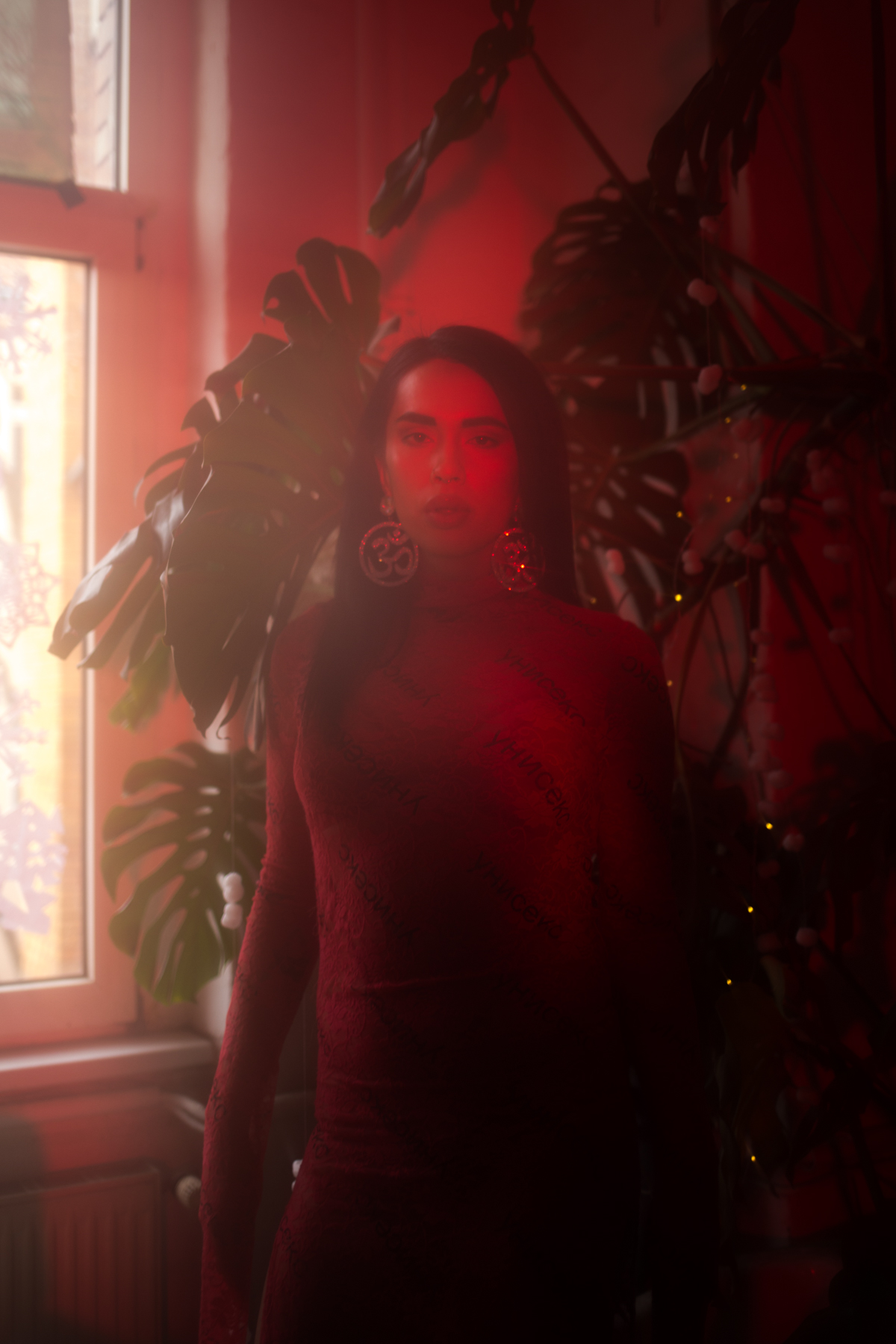
Stylist: Camille Naomi Fanke
Makeup and Hair: Prinz Basil
Alyha wears dress by Laura Gerte and earrings by Julia Seemann
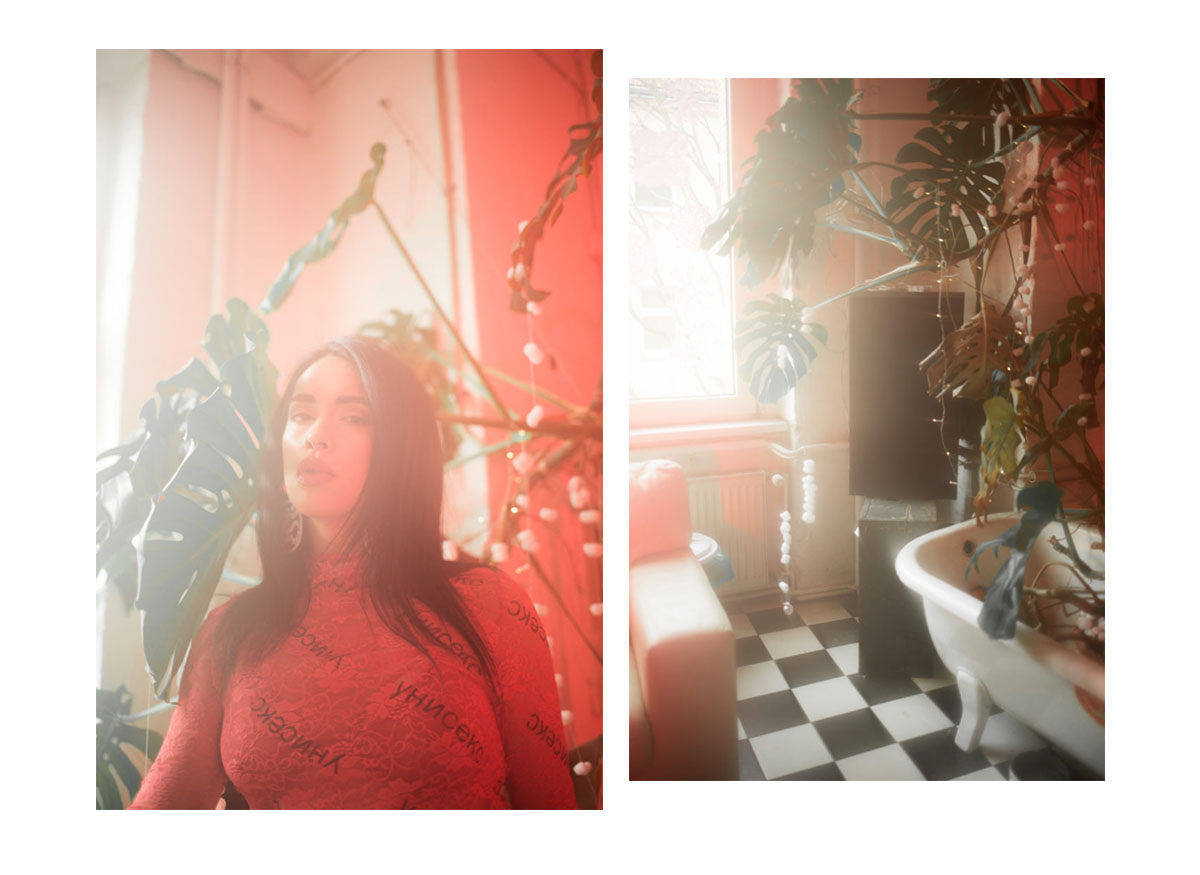
So when does that come up in conversation that you would tell someone you are trans?
Alyha: Well, this is the thing about me being semi-passing. I actually feel it’s much easier for me cos you can sort of tell I’m trans. To most people, I would not say anything. For some people who are not aware of the trans community, you do have to say something to them and explain: “This is who I am and we can talk about this. I can try to help you understand where I am coming from.” It’s happened at clubs before and literally, a guy would be from a small village [and say] “I don’t know how to handle this.” Then he kind of just left and it was okay because I totally understand. I wish I could have helped him understand a little bit more and see me in a different light, but at least the experience he had was that he was attracted to me from the beginning.
Do you feel like internalised racism is a symptom of systemic and institutionalised racism? What about internalised transphobia?
Alyha: I think to live in America, you are bombarded with portrayals of who you should be and how you should look [based on] European beauty standards; it creates this hatred for yourself. Trans people and people of colour are so beautiful. I also deal with this myself. Like, sometimes, I hate being trans, but then it is also what makes me different and special. Would I give it to give up to be cis? I don’t know. Ask me depending [on] the day or my mood.
On music
Can you tell us more about New World Dysorder?
Alyha: New World Dysorder is a trans/femme collective (started in 2015 in San Francisco, California) with four girls including Jasmine Infiniti; my best friend [and] mother, who really taught me how to be a woman, to be strong and accepting of other people. We created the collective because we would go out to parties where we would sometimes get bashed, so we needed to build a space that was safe for us.
Why was founding New World Dysorder so important to you?
Alyha: It’s important to have a space to be yourself, and it is important to have representation in the nightlife because the scene is dominated by cis white male DJs and promoters. I think it’s important to have someone like me on the roster or organising parties for like-minded people.
I read online that you mix everything from atmospheric techno to bass, to vogue beats, and house. The culture of voguing (that started in the 80s in Harlem) is intrinsically linked to POC from the LGBTQ+ community. Does this aspect make vogue beats particularly political for you?
Alyha: I like the sound but I do think that voguing and vogue beats are the music of the oppressed. This is where so many LGBT POC go to be themselves; to live in this fantasy where they are accepted[by] society. I think that is why it’s so popular nowadays. Also, it’s just good music.
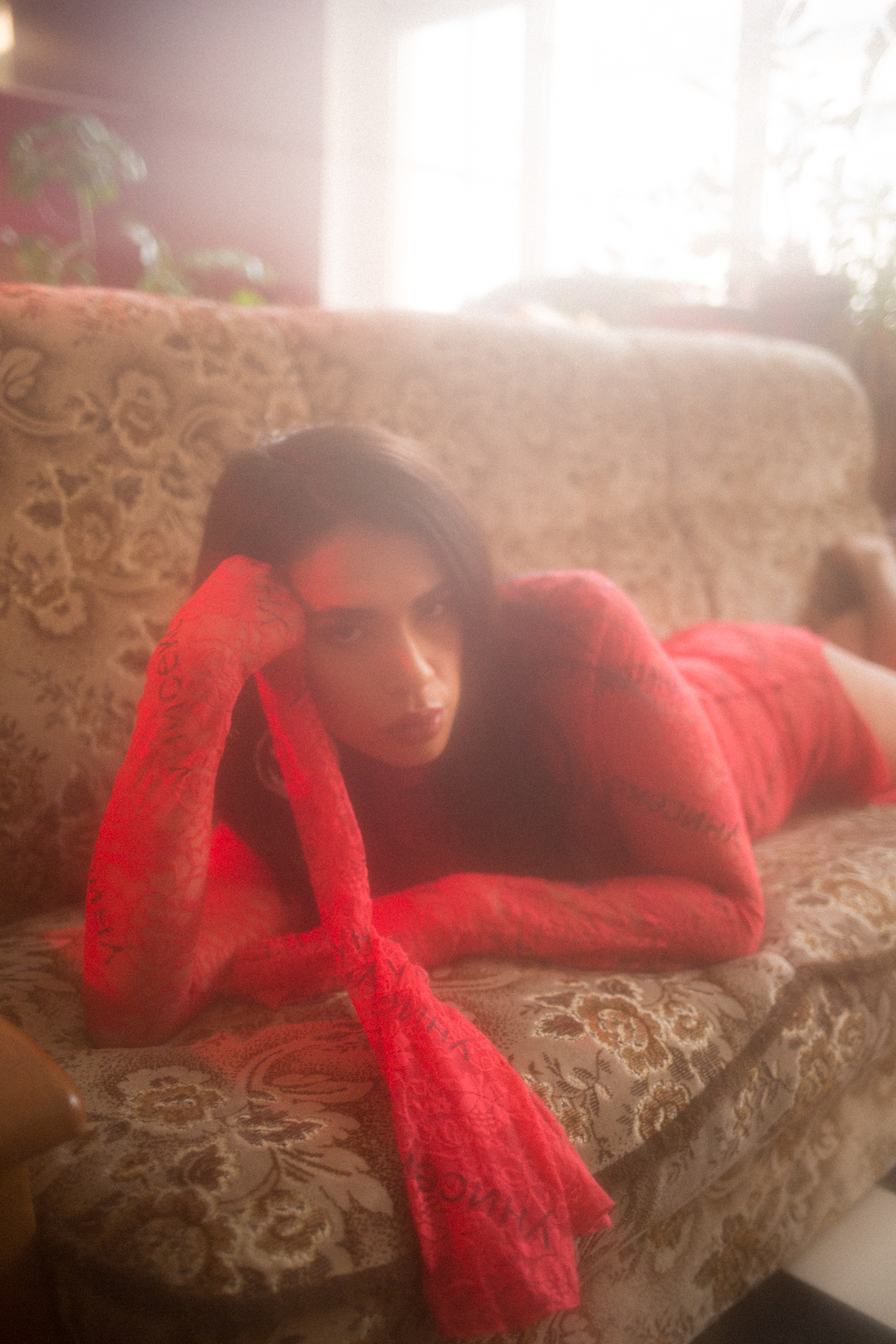
Stylist: Camille Naomi Fanke
Makeup and Hair: Prinz Basil
Alyha wears dress by Laura Gerte and earrings by Julia Seemann
Can you talk about any upcoming projects of yours? What big plans do you have in store for 2019? You mentioned this support group you are starting?
Alyha: I am doing this support group which is kind of the opposite of the parties I throw. On one hand, I give space to people who want to be wild but I am also trying to give space to people who need support, or who need a shoulder to cry on. Someone to hug and listen to their problems. It’s kind of like two opposite ends of the spectrum.
I am also learning how to produce music. I am trying to use music as a cathartic way [of] expressing my feelings as a trans woman in this world; to deal with what I am going through. I am also DJ-ing elsewhere and doing a monthly party to get my name out there and to provide spaces for people like myself.
I have a party on the 28th of Feb. I am flying out Jasmine Infiniti and another trans DJ from Lisbon. I am going to try to make this a monthly thing. I just want to have representation. In Berlin, there are so many queer parties which I feel aren’t that queer – they are gay, white and cisgender parties. Although they are really fun, I just want a person like me to throw a party. As I said, we need representation [and] I am here to represent.
_
Interview by Rae Tilly
Art direction: Rae Tilly and Camille Naomi Frankie
Photographer: Rae Tilly
Stylist: Camille Naomi Franke
Make-up: Prinz Basil
Visit Alyha on Instagram.



